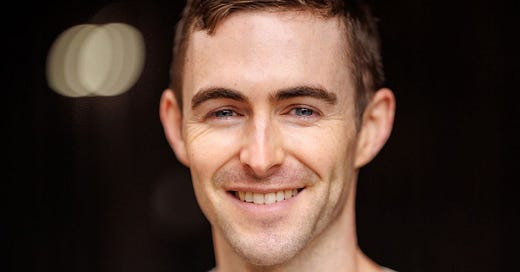Hi everyone,
I am writing to you from Colorado where I am about to go in for knee surgery. Wish me luck and I’ll be back here next week to tell you how it went. For today, we are shaking things up—Dr. Jake, author of Mental Health Movement, is taking over my newsletter! And I am taking over his (here!).
Here on BHK we’ve delved into why sleep is crucial for brain health and I’ve shared lots of tips for better sleep. Today I am excited to hear Dr. Jake’s point of view on the TikTok trend “sleepmaxxing.” Dr. Jake is a psychiatry physician & mental health educator who regularly helps his over 2 million followers on social media with science-backed strategies to support mental health. I hope you enjoy learning from him as much as I do.
This post is open access for all susbscribers. Feel free to share!
______________________________________________________________
Hi everyone,
Thank you for letting me visit Brain Health Kitchen this week!
I’m a medical doctor in my final year of psychiatry training. I’ve dedicated thousands of hours to understanding mental health, and today I want to talk about one of THE most important tools for your mental health.
What if I told you there was a free, science-backed way to improve your mood, lower anxiety, boost memory, and even protect your heart? You’d be all over it, right? Well, it exists - it’s called consistent, quality sleep.
The latest TikTok trend, “sleepmaxxing,” has people hyper-focused on optimizing their sleep routines, with influencers sharing tips, tricks, and some pretty wild ideas. From luxury gadgets to supplement mocktails, some of these hacks are more hype than help. But the core idea - prioritizing quality sleep - is something I work on with my patients every day as a mental health doctor.
By the way - if you want to see my “rankings” of different sleepmaxxing hacks, watch my latest IG video here.
Let’s dive into the real benefits of great sleep, the risks of neglecting it, and the simple, evidence-based ways to max out your rest without breaking the bank. And stick around till the end of the newsletter and I’ll give you my 1 page PDF: How To Sleep.
Why Sleep is the Best Medicine
Sleep is the ultimate multi-tasker. It improves brain function, strengthens the immune system, supports emotional regulation, and reduces the risk of chronic diseases like heart disease and diabetes. It’s even been shown to help maintain a healthy weight by balancing hunger hormones.
But here’s the catch: many of us don’t get enough of it. Between late-night doom-scrolling, stress, and caffeine overload, sleep often takes a back seat. Sleepmaxxing—if done wisely—can help us reclaim those precious hours of rest.
The Risks of Poor Sleep
When we sacrifice sleep, the effects show up fast:
Mood & Mental Health: Poor sleep increases anxiety, depression, and irritability.
Brain Fog: A lack of rest impairs memory, decision-making, and focus.
Physical Health: Chronic sleep deprivation can lead to a weakened immune system, high blood pressure, and even a shorter lifespan.
5 Evidence-Based Tips for Sleepmaxxing
Forget the expensive gadgets and extreme hacks. Here’s what really works:
Build a Sleep Cave
Make your bedroom a sanctuary for sleep. Keep it dark (use blackout curtains or an eye mask), quiet (earplugs or white noise machines work wonders), and cool (below 70°F is ideal).Create a Pre-Sleep Ritual
Train your brain to wind down with a consistent routine. My go-to is a warm shower, skincare, reading something calming, and turning on soothing rain sounds.Be Strategic About Light & Activity
Get plenty of daylight (with sunscreen, of course!) and exercise regularly to sync your circadian rhythm. But avoid intense workouts or bright screens right before bed.Watch What You Consume
My rule is to skip caffeine after 2 PM since it has a half-life of 5-6 hours. This means that a 4 PM coffee leaves half the caffeine in your system by 10 PM, disrupting sleep by blocking adenosine, the chemical that makes you tired. Limit alcohol and heavy meals at night, as they can also disrupt your sleep cycles.Don’t Force It
If you can’t fall asleep within 20 minutes, get up and do something calming—like folding laundry or reading a dull book—then try again. Sounds counterintuitive, I know, but trust me - it works.
Sleepmaxxing Is About Consistency, Not Perfection
As with any health goal, progress beats perfection. Even small improvements to your sleep hygiene can lead to big gains in how you feel physically and mentally.
Finally, here is your 1-page PDF guide, “How To Sleep”:
Final Thoughts
Your mental health is your most valuable asset. Protecting it isn’t about doing everything perfectly - it’s about making intentional choices that support your well-being.
If you found this newsletter helpful, I invite you to join the family at Mental Health Movement, my free weekly newsletter focused on building mental fitness and living a balanced life.
Thanks for stopping by Brain Health Kitchen Dr. Jake! I’ll be back next week after I’m back on my feet (literally). Until then, please do leave me any recommendations you have for good books, podcasts, great movies or TV, and anything else you can think of to keep me entertained while I’m laid up.
Thank you for reading, sharing, and taking the best care of your brain. I am grateful for everyone here on BHK.
Love,
Annie







Annie, pray all goes well and you heal quickly. Do your physical therapy and you will be up and about soon. You’re at the best place if in Colorado and hopefully a view of the mountains.
Unstoppable is a great movie on Prime. Quite motivating. All the best. Regina. I always enjoy your news letter!!
Love this takeover! Sleep & brain health 🤝